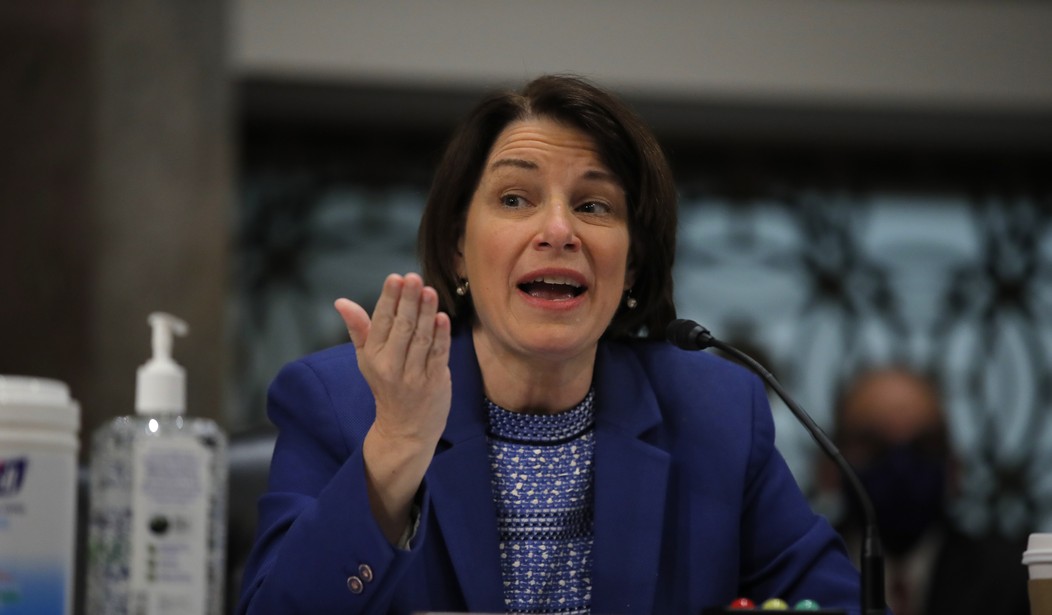Democrats are desperate to grow the size and scope of government before losing control of Congress after the midterm election.
Sen. Amy Klobuchar (D-Minn.) is working with far-left activists to ram two bills through Congress that would increase government control over the economy. Republican lawmakers should not help Democrats give the Biden Administration sweeping new powers on their way out the door.
During the impending lame-duck session of Congress, Klobuchar is expected to push hard for the “American Innovation and Choice Online Act” (AICOA), legislation that would ban a litany of business practices for companies above a government-determined size.
AICOA gives broad power to the Biden Department of Justice (DOJ) and Federal Trade Commission (FTC) to enforce the bill’s vague provisions. If a bureaucrat determines that a company has violated any part of AICOA, the government can fine the offender up to 10 percent of revenue.
AICOA has not proved popular with Klobuchar’s Senate colleagues – a July Washington Post survey showed only 17 Senators that support AICOA, and a recent Punchbowl News poll indicated that only 26 percent of senior Congressional aides believed their bosses supported the bill. No matter how you do the math, AICOA has far fewer than the 60 Senate votes needed to avert a legislative filibuster.
With AICOA proving so controversial, some progressive activists have suggested that the Open App Markets Act (OAMA) might be a less controversial alternative for Congress to consider during lame duck. While OAMA has garnered far less media attention than the AICOA, OAMA still amounts to an unwarranted federal intrusion into the private sector that conservatives should reject.
OAMA would prohibit companies that own app stores over a government-determined size from requiring app developers to use an in-app payment system owned by that company as a condition of entry into the app store. Like AICOA, the bill bans app stores from “unreasonably” preferencing its own apps over those of competitors without defining what “unreasonable” means.
The bill mandates that covered app stores allow users to install apps on a mobile device from a website instead of through an app store, a practice known as “sideloading.” This provision takes direct aim at Apple’s “walled garden” approach to app store operation that prohibits users from downloading third-party apps.
Forced sideloading has serious privacy and security implications for users, as apps downloaded outside of an app store are not scanned for malware, privacy settings, or other security standards that app stores operators require for participation in a marketplace. On net, app stores are safer and more reliable to use for downloading apps than sideloading – not only are harmful apps weeded out before they reach the marketplace, users can quickly contact app stores for assistance in the event something goes wrong.
Like AICOA, OAMA also gives broad enforcement authority to the Biden FTC and DOJ and state attorneys general. Adding insult to injury, OAMA contains an expansive private right of action, which would allow trial lawyers to make a killing launching frivolous lawsuits against app store operators.
OAMA’s animating premise is that Big Tech exerts too much control over the app ecosystem, and that the government needs to step in and force app stores to “open up.” Bill proponents have largely failed to explain why the government needs to get involved in the first place. Consumers that want a more open app ecosystem are free to use Google’s Android, while consumers that value a more closed environment can choose Apple’s App Store for free with the click of a button.
There is no reason for the government to get involved.
A small handful of Republican lawmakers have joined these efforts in an attempt to stop Big Tech targeting of conservative voices online. Republicans who support these bills should understand that no Democrat will ever sign off on legislation that would improve the situation for conservatives on the internet.
Far-left groups like Fight for the Future, Demand Progress, and the Open Markets Institute support these bills. Antitrust legislation like AICOA and OAMA are Trojan horses designed to grow the size and scope of government.
Democrats know that they have an increasingly narrow window to give the Biden Administration more power before losing control of Congress. No Republican should lend the left a helping hand.
Tom Hebert is federal affairs manager at Americans for Tax Reform and executive director of the Open Competition Center.
























Join the conversation as a VIP Member